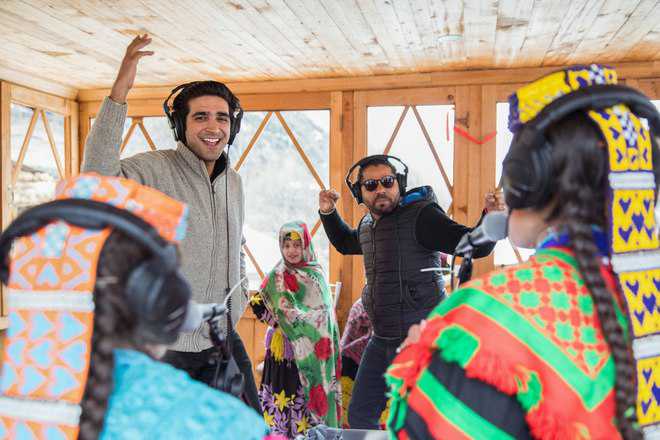
The new finds: Producers Zohaib Kazi and Ali Hamza with Ariana and Amrina from the remote valley of Kalash.
Faiqa Mansab
Coke Studio Explorer is a new chapter in the Coke Studio franchise. With this venture, producers Zohaib Kazi and Ali Hamza take on the mantle of music archivists — almost like activists — and the play on the word is deliberate because, in today’s world, music remains one of the very few evocations that can still bring people together, regardless of ethno-socio-political or any other difference. In fact, difference is the raison d’être of Coke Studio Explorer and what better way to celebrate the beauty of difference and diversity than music?
“At the core of this journey,” says Kazi, “is the need for connectivity — geographically, culturally — in every way possible, with the audience. This prequel is a taste of what is to come in the season.”
Kazi and Hamza have travelled across Pakistan to find the rarest of gems, unheard songs and the hidden tales within the music that cradles them. “It’s a visual documentation of our journey,” adds Hamza. “We wanted to experience the country, the music… tap into the spirit of the nation.”
As the two speak, the passion for music and their country resonates in their voices, adding to each other’s comments, painfully aware of the national and global political chaos. Music makes clichéd ideas of patriotism, diversity, unity and cultural richness dissolve and what comes out of these far-flung places that Coke Studio Explorer presents captures the hearts of even the most jaded audience. “It’s not just about the green part of the flag, you know. It’s also about the white bits,” says Kazi.
The song, “Pareek”, sung by Ariana and Amrina from the remote and isolated valley of Kalash, is a uniquely original story of the raw talent found all over Pakistan.
Kazi says, “We wanted to tap into the unseen, unknown areas of the country. We’ve grown up with stories of how beautiful Kalash is, how beautiful Kashmir is… but how many of us can recognise the poetry of that place? How many of us have seen the language written on an old letter, with a verse of song tucked in? We wanted to see all that. We wanted to share that. Curiosity is a big part of this journey.”
Coke Studio has given a platform to folk music alongside pop; it has been the most successful fusion platform of several decades as much in India as in Pakistan. “We recognise the enormity of the task. There was no element of fear, only a sense of responsibility and excitement. We’re a small part of a huge legacy and we’re adding another layer to it. We’re doing what we believe in.”
The producers share that they felt the process was intuitive for them. “It’s the human story we followed. We discovered Shamu Bai and Vishnu, and they were incredible. The place was extraordinary too. And then everything just came together. They sang and recorded “Faqeera” in this old haveli in Sindh. There were all kinds of sounds and noises, including cows, but the reverbs were great, and we didn’t switch to the computer. We wanted to capture the authenticity of the sound.”
Music lies at the very heart of Pakistan, and Coke Studio has become both the metaphor and a metonym for it in the last decade. Coke Studio Explorer is setting a new pattern to the way music is perceived. It isn’t just heard any more. The places that birthed the music are as important as the songs. The symbolism of the tall tower, the old haveli, the open spaces and the lofty mountains is hard to miss. The deeply moving strains of Qasamir’s “Ha Gulo”, sung in Muzzafarabad, the heartbreakingly beautiful valleys of Kashmir, is a testament to that ideology.
“Out of the five artistes, four are women. We didn’t plan it. It was a happy coincidence. All these artistes are also featured in the main show,” says Hamza. “Coke Studio Explorer is a narrative of inclusivity, togetherness, and everything that we saw… that the audience see… that all this, is as much them — the audience — as us. It is the story, the music, the image, of us all.”
The whole show is an apt representation of this idea. Mishal Khawaja’s “Tere Bin Soona” speaks to the audience that is intimate with the diaspora and displacement. Her performance is evocative and poignant. She is an expat living in Canada. She wanted to reconnect with her roots, know her story through music.
The show premiered on July 3. The duo says they are at the start of the journey. “When it all comes together when the journey consolidates and the audience share it with us, with the artistes, the musicians, the whole team… that’s when the magic happens, that’s the fulfillment of ideas.”
Music aficionados around the world would agree. The journey of music begins outside and ends within. Coke Studio Explorer is taking millions of fans on a journey of the country and her people, and we can’t wait to see more.



























